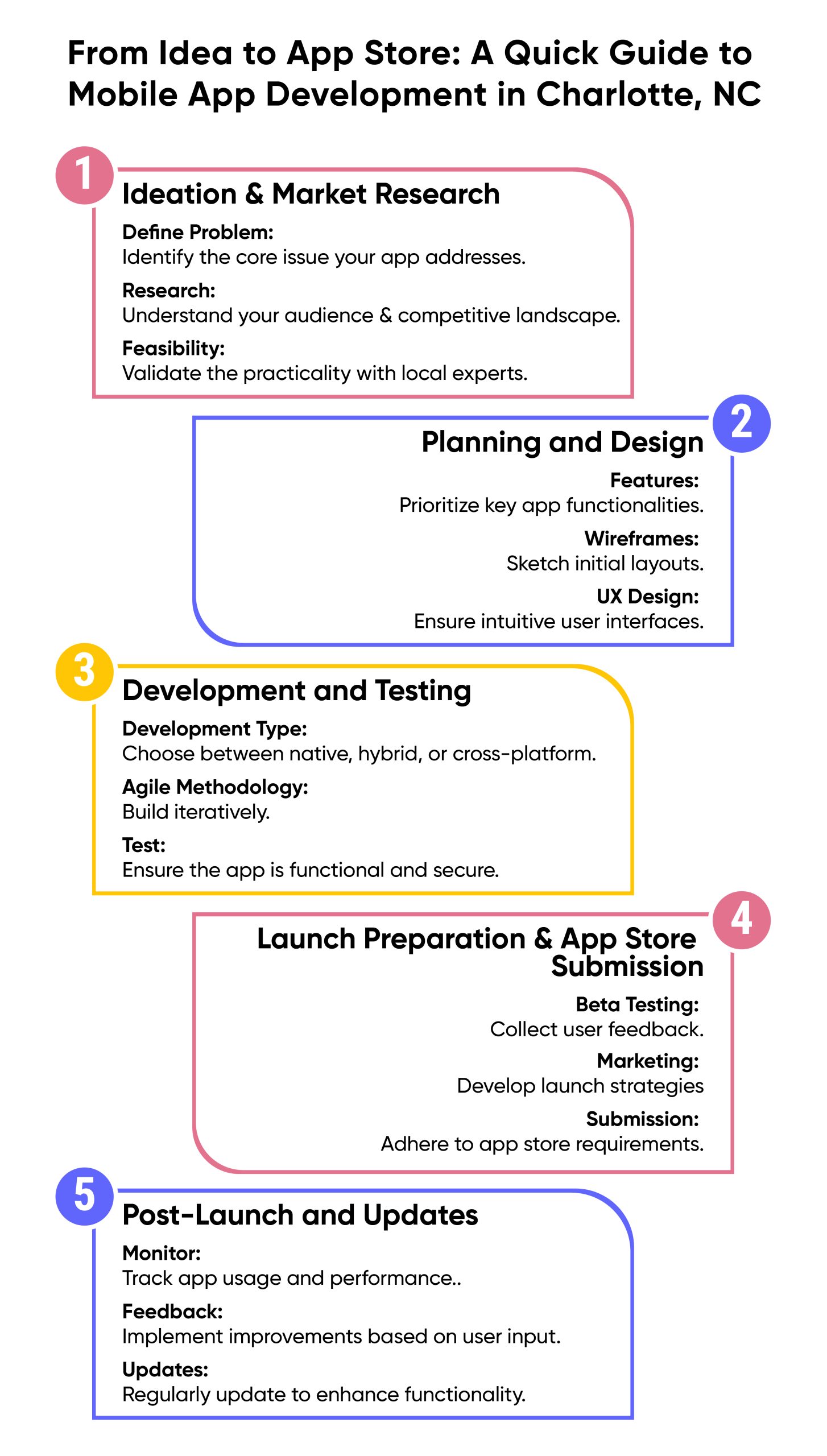Navigating the bustling tech scene in Charlotte, NC, can be terrifying when searching for the right talent to bring your mobile app idea to life. Whether you’re a startup guru, a seasoned entrepreneur, or a business looking to expand digitally, finding the right developer is crucial. If you want to learn about the ins and outs of hiring for mobile app development in Charlotte NC, then you have arrived at the right place.
Understanding Your Project Needs
Before jumping into the hiring process, it’s essential to pin down what you need. Mobile app development isn’t a one-size-fits-all scenario. Consider the following to clarify your project scope:
- Purpose of the App: What problem is your app solving? Is it a commercial product or an internal tool?
- Target Audience: Who are your users, and what are their usage patterns?
- Platform Choices: Are you looking at purely Android, iOS, or both? How about considering cross-platform mobile app development vs native?
Understanding these fundamentals will shape your hiring decisions, ensuring you seek out developers with the right expertise.

Where to Look for Mobile App Developers in Charlotte, NC
Charlotte has a vibrant tech community with plenty of talent. Here’s where you can start your search:
- Tech Meetups and Conferences: Engage with local tech groups like Charlotte IoT or Charlotte Devs.
- Local Universities: Connect with computer science departments in institutions like UNC Charlotte or Queens University.
- Tech Hubs and Coworking Spaces: Packard Place and Advent Coworking often host networking events and bulletin boards with job postings.
Evaluating Potential Candidates
Once you’ve attracted a pool of candidates, evaluating them effectively is critical. Here are some strategies:
- Review Portfolios: Look for detailed explanations of projects and specific contributions.
- Technical Interviews: Gauge problem-solving abilities with practical questions relevant to app development.
- Personality Fit: Ensure the candidate’s values align with your company culture.
Critical Skills to Look For
Hiring the right developer means looking beyond technical skills. Keep an eye out for:
- Adaptability: Mobile development is fast-paced. Candidates should be quick learners.
- Communication: Developers need to articulate problems and solutions clearly.
- Attention to Detail: Necessary for debugging and ensuring high-quality user experiences.
Cost Considerations
One of the most pivotal aspects of hiring is budgeting correctly. Here’s an overview of potential costs involved:
| Expense Category |
Low Range |
High Range |
| Freelance Developer |
$50/hr |
$150/hr |
| Development Agency |
$10,000 |
$500,000 |
| DIY App Builders |
$25/mo |
$300/mo |
Note: The average cost of android app development might differ based on complexity, developer experience, and whether you choose a native or cross-platform approach.
Setting Up a Productive Workflow
After hiring, the next step is integrating your new developer or team into your workflow. Effective strategies include:
- Regular Check-ins: Weekly meetings help keep everyone on track.
- Agile Development Practices: Sprints and iterative reviews can help catch issues early.
- Clear Documentation: Ensure that all project specs are documented and accessible.
Legal and Contractual Considerations
When you bring someone on board, especially on a contractual basis, legalities must be addressed:
- Contracts: Clearly outline deliverables, timelines, and payment terms.
- Intellectual Property: Ensure that your agreements cover who owns the app and its code.
- Non-Disclosure Agreements (NDAs): Protect your idea and proprietary information.
Onboarding and Integration Strategies
Successfully onboarding a new mobile app developer—or an entire development team—is crucial for immediate productivity and long-term success. Effective onboarding helps new hires understand their roles deeply, align with company culture, and begin contributing quickly. Here are some strategies to ensure a smooth integration process:
- Pre-Onboarding Preparation: Before the developer’s first day, provide them with all necessary hardware and software. Set up their email accounts, access company resources, and any tools they need to start working. This also includes documentation about ongoing projects they will be involved in.
- First-Day Introductions: Make the first day about relationships. Introduce the new developer to their team and other key players in the company. A mentor or buddy system can be particularly effective, pairing the new hire with a more experienced employee who can guide them through their first weeks.
- Comprehensive Training: Even experienced developers need time to understand a new company’s processes and expectations. Tailor the training to cover your development methodologies, project management tools, and codebase standards. Regular training sessions over the first few weeks can facilitate a deeper understanding and smoother workflow.
- Clear Role and Expectations: Clearly define what success looks like for their role. This includes short-term goals for the first 30, 60, and 90 days and more detailed expectations for their contributions to projects. Transparency in what is expected helps new developers focus and prioritize effectively.
- Regular Feedback Loops: Establish a feedback loop with new developers. Weekly one-on-one meetings can be an excellent way for managers and new hires to address questions, discuss challenges, and acknowledge achievements. This accelerates the developer’s growth and integrates them into the team’s culture.
- Social Integration: Facilitate opportunities for new hires to connect with other team members on less formal bases, such as team lunches or company outings. Social connections at work can boost morale and foster team spirit, essential for collaborative projects like app development.
Post-Launch Support and Updates
Launching your mobile app is a significant milestone, but the journey continues. Continuous support and regular updates are critical to maintaining user engagement and ensuring your application adapts to evolving market demands and technology changes. Here’s how to effectively manage post-launch activities:
- Establish a Support Team: Ensure you have a dedicated team ready to handle technical support and user feedback from day one. This team should be equipped to address bugs, performance issues, and user inquiries promptly to maintain a positive user experience
- Monitor User Feedback: Actively monitor reviews and feedback across all platforms where the app is available. Tools like Google Play Console and Apple’s App Store Connect provide insights into how users interact with your app and highlight areas for improvement. This feedback is invaluable for prioritizing future updates.
- Plan for Regular Updates: Schedule regular updates to keep the app relevant and engaging. Updates can include new features, design refreshes, security enhancements, and fixes for any issues users encounter. Communicate upcoming updates to users to keep them informed and engaged.
- Focus on Security: Post-launch, ensuring the app’s security is crucial. Regularly update the app’s software libraries, implement patches for any vulnerabilities discovered, and ensure compliance with data protection regulations to safeguard user data.
- Performance Optimization: Continuously monitor the app’s performance and optimize it to improve speed and responsiveness. Performance analytics tools can help identify bottlenecks and areas where the user experience can be enhanced.
- Marketing and User Retention Strategies: Post-launch marketing is essential to keep your app in the public eye. Implement targeted ads, promotional campaigns, and social media engagement to retain existing users and attract new ones. Offering referral incentives can also be an effective way to increase your user base.
FAQs
1 What is the difference between native and cross-platform mobile app development?
Native app development involves building apps for specific platforms using languages and tools designed specifically for those platforms. Cross-platform development allows for a single app version that runs on multiple platforms.
2 How long does developing a mobile app in Charlotte, NC, take?
The timeline can vary widely depending on the app’s complexity and scope, but typical projects range from 3 to 9 months.
3 What should I prepare before meeting with potential developers?
Have a clear concept, target audience, and initial wireframes or design ideas ready to discuss.
4 Can I find developers who will work within my budget?
Yes, Charlotte offers a range of options, from freelance developers to full-scale development agencies that can accommodate various budgets.
5 How do I ensure the security of my app when outsourcing development?
Hire reputable developers, conduct thorough vetting, and include security protocols and expectations in your contract.
Conclusion For Mobile App Development in Charlotte NC
Hiring the right mobile app developer in Charlotte, NC, is a complex but rewarding endeavor that involves a clear understanding, thorough vetting, and careful planning. By following the guidelines outlined—from understanding your project needs to effectively onboarding and integrating new hires and ensuring robust post-launch support—you’re setting yourself up for success in the competitive tech landscape. These strategies facilitate a smooth transition from concept to launch and ensure that your app remains relevant and high-performing in the long run. With this comprehensive approach, you are better equipped to navigate mobile app development challenges and position your project for ongoing success.






